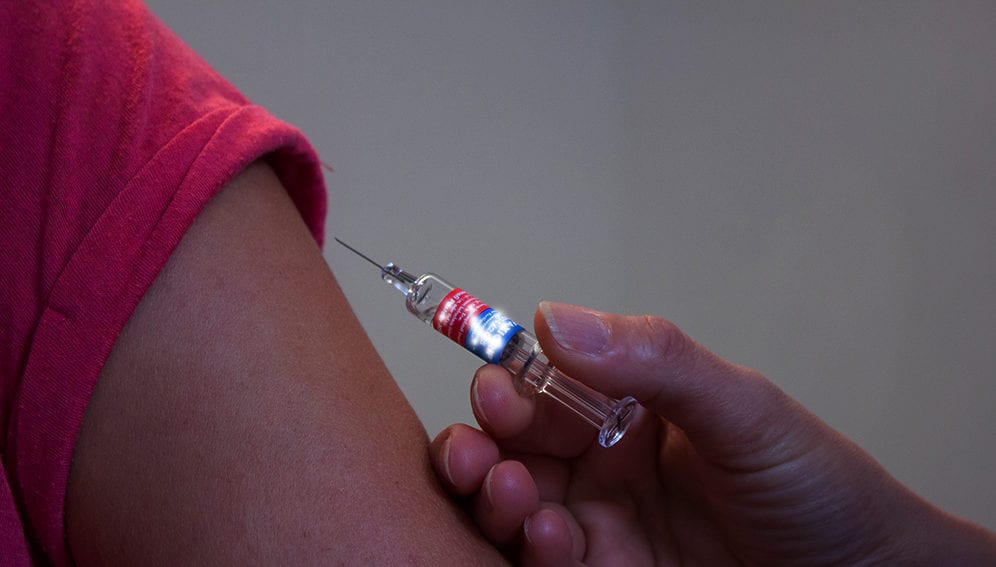13/05/19
Venezuela struggles to halt measles epidemic

By: Marielba Núñez
Send to a friend
The details you provide on this page will not be used to send unsolicited email, and will not be sold to a 3rd party. See privacy policy.
[CARACAS] Measles transmission is still active in Venezuela and public health measures to control the outbreak since it began in 2017 have not been sufficient, health experts say.
With 5,667 confirmed cases of measles in 2018, and a further 140 in the first quarter of 2019, Venezuela has the highest number of autochthonous cases of the disease in South America, and fifth highest in the world, according to a report by Venezuelan health experts.
The report notes that while a mass vaccination programme has substantially reduced the spread of the disease, it has not been enough to prevent new cases emerging.
“Why did we get to the measles epidemic? Because vaccination protocols and control of healthy children were neglected,”
Marianella Herrera, president of the Venezuelan Health Observatory
Measles is a highly contagious disease that currently kills tens of thousands of young children a year, despite the availability of a vaccine which the World Health Organisation says is safe and cost-effective.
The report published May 1 by the Venezuelan Society of Public Health and the Defend National Epidemiology Network found that Venezuela represents 52 per cent of the total reported in South America this year, followed by Colombia with 87 cases (36 per cent) and Brazil with 29 cases (11 per cent).
The three countries are affected by the same virus genotype and lineage detected in Venezuela at the start of the outbreak. “Now, these three countries have lost the status of measles-free territories,” the report says.
Measles cases have been registered in 12 Latin American countries in the last two years. But the other nine countries have only reported imported cases, often coming from outside the region and associated with different genotypes.
The latest analysis takes into account the most recent Epidemiological Update Report published by the Pan American Health Organization (PAHOI) on April 18 and includes data from a UNICEF report, released March 1.
UNICEF and the WHO warned last month of a “global measles crisis”, highlighting a 300 per cent surge in the number of measles cases during the first three months of this year, compared to the same period last year.
The Venezuelan report states that the country ranked fifth highest for measles cases worldwide in 2018, after Ukraine, the Philippines, Brazil and Yemen.
However, Venezuela has the highest incidence of the disease in Latin America, with a rate of 196 cases per million inhabitants, four times higher than Brazil, with 49 cases per million inhabitants.
It also has the greatest number of deaths linked to the disease, with 136 confirmed in 2018 and first quarter of 2019. This was followed by Brazil with 12 deaths in the same period.
The report acknowledged that efforts had been made to control the disease, including a mass vaccination programme, for which the country acquired about 13 million doses of vaccines.
Mass vaccination “has allowed a substantial reduction of cases”, but the epidemic continues with new cases “in 14 federal entities in the last quarter of 2018 and 10 federal entities in the first quarter of 2019”, according to the report.
Huníades Urbina, president of the Venezuelan Society of Paediatrics, said the persistence of new cases signaled that vaccination coverage was insufficient. “We are not reaching all the populations we should be,” he told SciDev.Net.
This opinion is echoed in the report by Venezuelan health experts which calls for better protection for the most vulnerable across the country. “This is still to be achieved, especially in the border territories, with dispersed population and difficult access,” the report said.
Marianella Herrera, president of the Venezuelan Health Observatory and researcher at the Center for Development Studies of the Central University of Venezuela, told SciDev.Net that it was difficult to make an accurate assessment of vaccination coverage as the government does not release official figures.
“People distrust the implementation of vaccination programmes because they were not done well in the past. Why did we get to the measles epidemic? Because vaccination protocols and control of healthy children were neglected,” she said.The Venezuelan Paediatric Society recommends that children should receive the first dose of the measles vaccine at the age of 12 months and the second dose between 18 and 24 months old.
According to UNICEF, coverage of the first dose of the measles vaccine in Venezuela reached 92 per cent in 2015, 88 per cent in 2016 and 96 per cent in 2017, but the second dose, necessary to guarantee protection, did not exceed 59 per cent in those three years.
Read the full report.
This article was produced by SciDev.Net’s Latin America & Caribbean desk and edited for clarity













